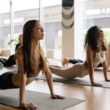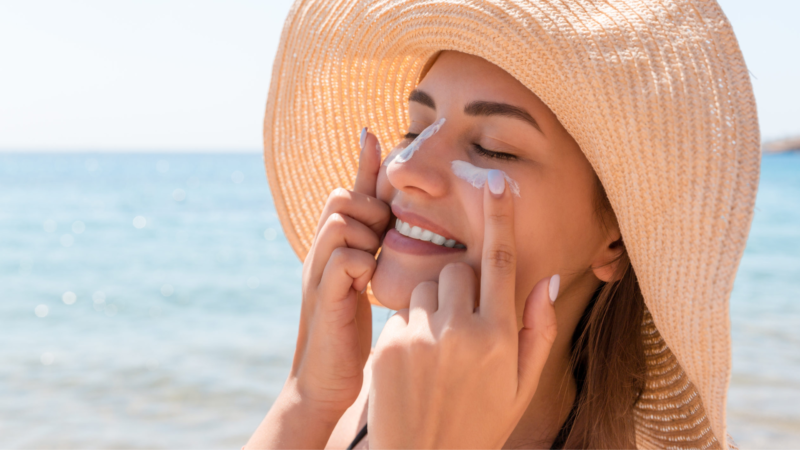The summertime brings with it endless possibilities for outdoor fun and activities, but there is one thing you should never forget – sunscreen! Sunscreen protects us from harmful UV rays, such as wrinkles and cancer, that can cause long-term skin damage. It is important to keep our skin healthy and protected during summer by choosing the right sunscreen for your needs.
In this article, we will explore why wearing sunscreen is so essential during the summer months, what types of sunscreens are available, how to choose a good one that suits your needs, and other tips on proper use. With this information, you can protect yourself from the sun’s damaging rays while having an enjoyable time outdoors this summer!
Do you want to protect your skin from the harmful rays of the sun?

Everyone should know the risks of not wearing sunscreen, especially during peak summer. Sunscreen is important because it can help protect you from premature aging, loud spots, and even types of cancer directly caused by UV exposure. It’s also important for people with ethnic or darker skin tones.
By taking a few simple prevention steps – like applying sunscreen daily – you can reduce your risk for all kinds of common health problems connected to being overexposed to UV rays. You will feel more comfortable and confident out in the sun knowing that you’re protected against its most damaging effects when you use sunscreen regularly throughout the year.
How sunscreen protects you from the sun’s rays?
Sunscreen is a vital tool we should all have in our arsenal when spending time outside. It’s incredibly effective at protecting our skin from the sun’s damaging rays, especially with the growing concern over skin cancer caused by prolonged exposure to harmful UV rays.
By using sunscreen daily, we can enjoy being outdoors while protecting our skin.
Here are how sunscreen help to protect your skin:
- Sunscreen blocks harmful UVA and UVB rays from the sun, which can cause wrinkles, sunburns, skin cancer, and other skin damage.
- Regular use of sunscreen has been proven to help prevent premature skin aging due to exposure to damaging ultraviolet light.
- Sunscreen helps protect your skin from the sun’s heat, allowing you to enjoy outdoor activities without feeling too hot or uncomfortable.
- By providing a physical barrier between your skin and the sun’s rays, sunscreen can help reduce inflammation and irritation caused by sunburn and other UV-related skin problems.
Sunscreen helps to protect your skin from the sun’s damaging rays, even when you don’t think you need it. When we apply sunscreen, we form a layer over our skin that deflects or absorbs the UV light before it has a chance to penetrate deeper into our skin. This helps prevent sunburn, premature aging, and other skin problems.
Different types of sunscreen and how to choose the right one
Sunscreen is essential for protecting your skin from harmful UVA and UVB rays, but with so many options on the market, it can be overwhelming to choose the right one. Understanding the different types of sunscreen available can help you make an informed decision.
- Chemical sunscreens contain ingredients that absorb and dissipate UV radiation.
- Physical sunscreens create a barrier that reflects the sun’s rays.
- Some sunscreens offer broad-spectrum protection, protecting against both UVA and UVB rays.
Other factors to consider when choosing a sunscreen include your skin type, activity level, and any potential allergies or sensitivities.
By taking the time to consider your needs and preferences, you can find a sunscreen that works for you and helps keep your skin safe from the sun’s damaging rays.
Tips for applying sunscreen properly

Applying sunscreen properly often involves more than slapping it on and rushing into the sun. Knowing a few tips for applying it correctly can make a big difference in how effectively it protects your skin.
- First, ensure you’re using enough – the recommended amount is about a shot glass worth for your entire body.
- Be sure to reapply every two hours or after swimming or sweating.
- Don’t forget to cover all areas of your skin, including your ears and the tops of your feet.
- And lastly, be sure to give it plenty of time to soak in before heading outside, as sunscreen takes about 15 minutes to absorb into your skin fully.
By following these tips, you can ensure you get the most out of your sunscreen and keep your skin healthy and protected.
When to reapply sunscreen during outdoor activities?
It’s important to remember that sunscreen isn’t a one-time application during outdoor activities. Experts recommend reapplying every two hours or immediately after sweating, swimming, or drying off with a towel. This is because the level of protection decreases over time, leaving you vulnerable to harmful UV rays.
Don’t let a cloudy day fool you, as those rays can still penetrate the clouds. So, whether hiking, swimming, or playing sports, keep your sunscreen on hand and reapply frequently to enjoy your time outside safely.
Benefits of wearing sunglasses in addition to sunscreen

Wearing sunglasses provides many benefits in addition to using sunscreen. Sunglasses protect your eyes from harmful UV rays that can lead to cataracts, macular degeneration, and other vision problems.
Additionally, wearing sunglasses reduces the risk of wrinkles and premature eye aging. Choosing sunglasses with polarized lenses can help reduce glare and improve visibility, especially when driving on sunny days.
Sunglasses are also a fashion accessory that can add style to any outfit while protecting your eyes and skin from the damaging effects of the sun. Remember to choose sunglasses with 100% UVA and UVB protection for optimal benefits.
The dangers of UV rays and skin cancer prevention
As we bask in the sun’s warmth, it’s easy to forget that the golden rays can harm our skin. Unprotected exposure to UV rays can cause:
- Skin damage.
- Premature aging.
- Skin cancer.
Skin damage is the number one concern when it comes to sun exposure. UV radiation can cause premature aging, skin discoloration, and even increase the risk of skin cancer.
The key to prevention is protection. Wearing protective clothing, using sunscreen, and avoiding exposure when the sun is at its strongest can drastically reduce the risks of UV rays. So, before entering the crisp sunny weather, remember to protect your skin and stay cancer-free.
Tips to help remind you to wear sunscreen every day
It’s easy to forget to apply sunscreen, especially when heading out on an errand or running a quick task. Fortunately, some tips can remind you to wear sunscreen every day.
- Keep your sunscreen in easy-to-access locations, such as your car or desk drawer.
- Set a reminder on your phone or calendar to apply sunscreen.
- And lastly, pair your sunscreen application with a routine activity such as brushing your teeth before bed or putting on lotion after showering.
By following these tips, you can help ensure you’re getting the most out of your sunscreen and protecting your skin from the damaging effects of UV rays.
Frequently asked questions about the importance of sunscreen
Q: How often should I wear sunscreen during the summer months?
A: It’s a good idea to wear sunscreen daily, regardless of how sunny it is.
Q: What are the benefits of wearing sunglasses in addition to sunscreen?
A: Sunglasses provide extra protection from UV rays, reduce glare, protect your eyes from wrinkles and premature aging, and can even be a fashion accessory.
Q: What type of sunscreen should I use?
A: There are various types of sunscreen available on the market today. Look for a broad-spectrum sunscreen with at least SPF 30 and UVA/UVB protection.
Q: How often should I reapply my sunscreen?
A: Reapply your sunscreen every two hours or after swimming, sweating, or drying off with a towel.
Q: How much sunscreen should I use?
A: Experts recommend applying two tablespoons of sunscreen to your face and body for adequate protection.
Conclusion
Taking the time to plan for the sun’s risks is worth it in the long run. Regularly applying sunscreen is essential given that dangerous ultraviolet rays directly impact our health and well-being – especially during the summer months when powerful UV radiation is at its peak. Of course, seeking shade, wearing protective clothing, or avoiding excessive sun exposure will further help protect against harmful UV rays. Arming yourself with high-quality sunscreen is an absolute must; you won’t regret stocking up on your favorite SPF!
Don’t forget to slather on this lifesaver year-round – no matter what season or activity you are doing outside – as traces of UV radiation can still penetrate in winter months and higher elevations, added by cloudier days. It’s better to be safe than sorry, especially when safeguarding your skin from potential damage and the long-term negative effects of prolonged sun exposure. There’s nothing more important than taking proactive steps to protect ourselves and those around us from ultraviolet light, so be sure to keep sunscreen handy and use it whenever you go out in the sunshine!









